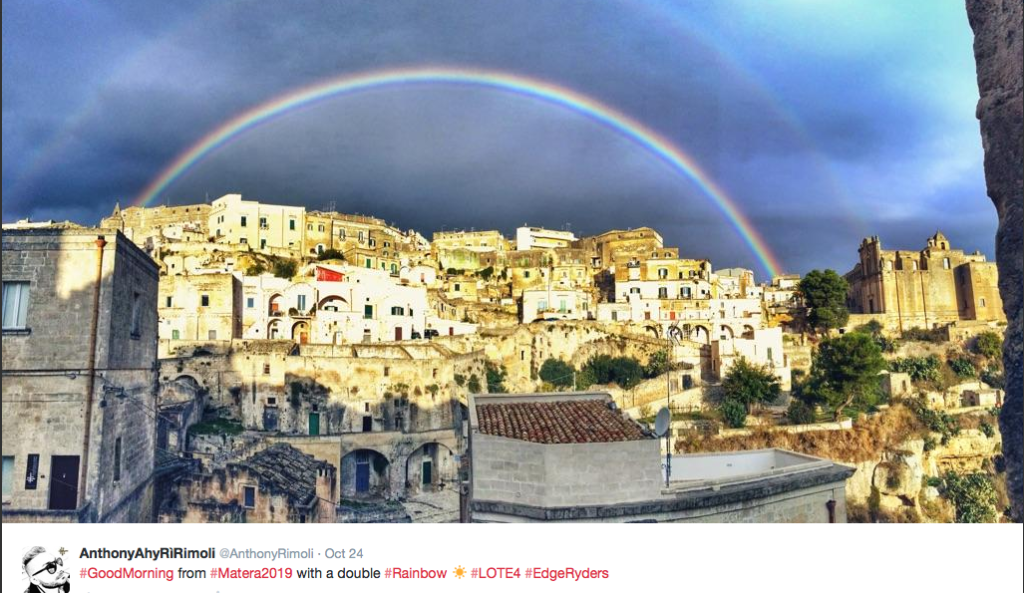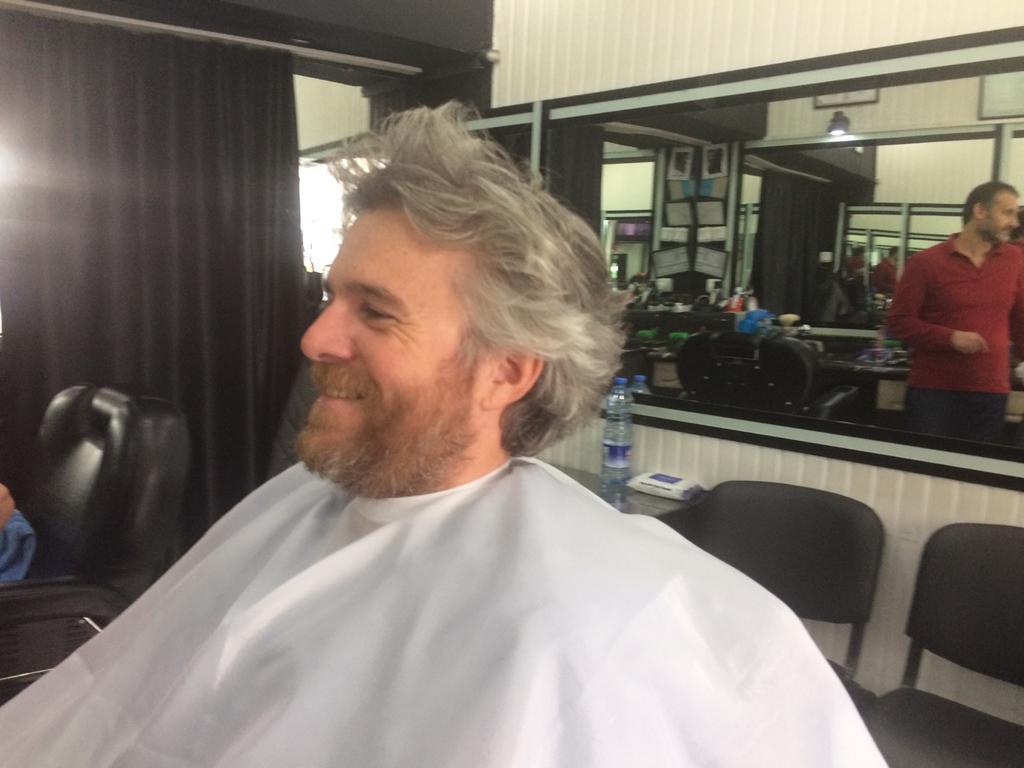Arriving at the unMonastery in Matera, Italy after so many months revived me. I felt as a saint being greeted so effusively as I made the rounds of the building where the unMonasterians once resided and would once again for the duration of the social innovation conference, Living on the Edge 4 (#LOTE4), the theme of which would be stewardship.
I had the accidental opportunity of spending two (non-consecutive) weeks at the unMonastery this past summer as an “honorary” unMonk. Initially staying one week in May, I began to realize what was going on "in there" by the end of my stay and returned a month later after proposing a scandalous project which developed and morphed into something (according to some) even worse: CoNapping. The action was quickly kiboshed by the city's liaison after dismissing it as a "meaningless joke," a sentiment that was endorsed by several local newspapers.
So the unMonasterians were all here once again welcoming the attendees to the global IRL meetup of a relatively small chunk (approx. 50-60 people) of the entire 2,387 member Edgeryder online community, which is where the unMonastery idea came to life in the first place.
Tickets to #LOTE4 could not be purchased and participants of the conference (myself included) earned their tickets by bartering on Makerfox, though in the end it proved a bit complicated and became a barrier to participation rather than a facilitator. They're working on it…

The upstairs living quarters happened to have a vacant bed for me to occupy when Marc, an unMonk who opted to remain in Matera after the closing of unMon, slept at his nearby apartment instead.
LOTE4 began the next morning and, as tradition prescribed, unMonks began the day with a sharing circle in which we all shared our feelings. Several newcomers attended the circle and, passing the stone, we shared our joys at being reunited and our fears of the coming days and especially the tasks involved with keeping the unMonastery running under the weight of so many people!
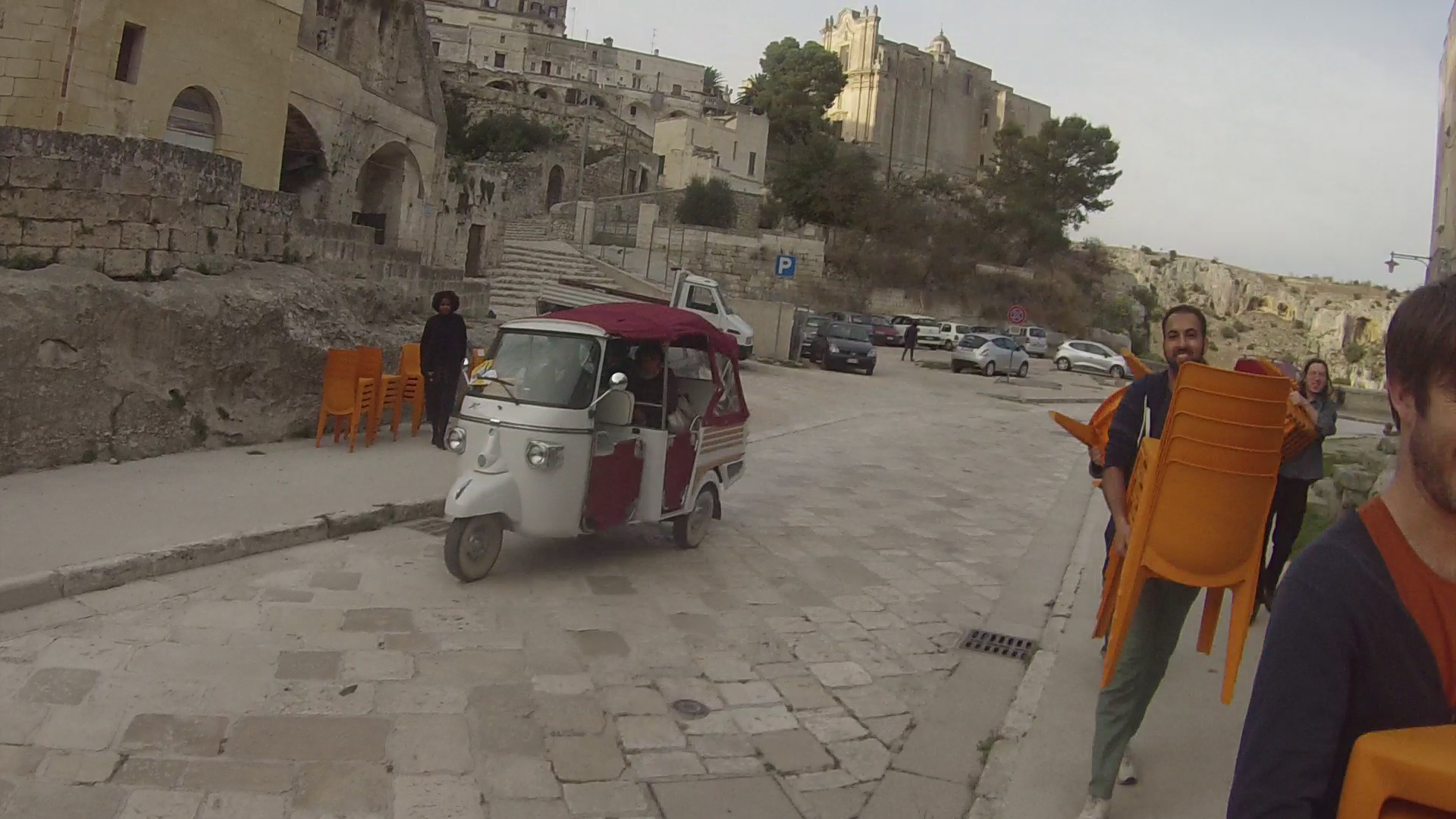
Maria and I had to prepare for our workshop, which included printing out the 'zine we made especially for the event. Others were busy in the kitchen, hackers were busy in the cave hacking and before we knew it the official (public) opening ceremony was upon us and we all flooded into the upstairs meeting hall.
We were introduced to the curators of this year's LOTE who would each be following one of the conference's three tracks. The overarching theme was stewardship — a term which none present seemed to agree on the definition of. Among the curators was Amelia Andersdotter, who, as member of European Parliament for the Pirate Party, was well placed to curate the Digital Assets track, which focused on the "viability and economics of 'free' digital artifacts." An example of this is the ongoing debate about copyright, the beneficiaries of which seem intent on keeping "their" materials out of reach for longer than humanly possible.
"In the absence of political will to develop the Digital Commons as a free & open, public resource, what can we hack ourselves and how, and where are the limits beyond which we need public infrastructure and proper policies?" -Edgeryders
The Physical Assets track, curated by Fabrizio Barca & Caroline Paulick-Thiel, discussed different forms of "generating, managing and lobbying for an engagement with physical assets in way that is supporting sustainable development of our societies." During these sessions, they were discussing how to manage public goods on an institutional level that are in collective possession.
The Communities track was to focus on community stewardship of the previously mentioned physical and digital goods; are communities ready for that burden? How can we prepare them for that task?
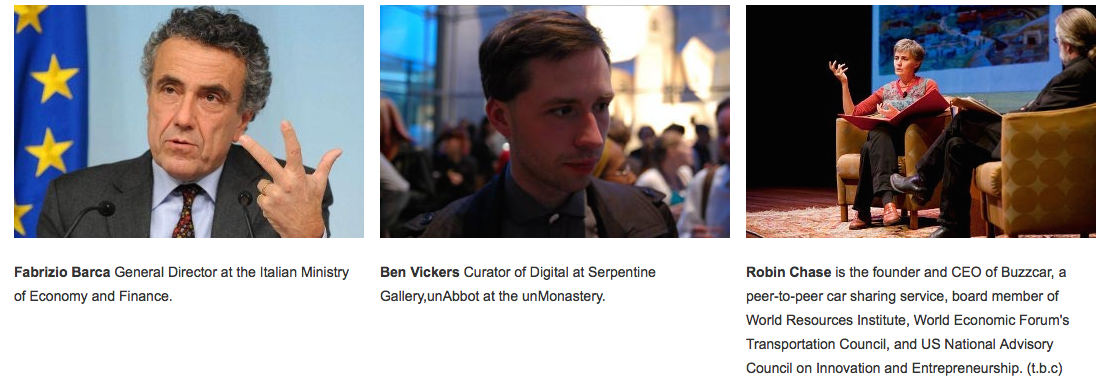
The Edgeryders seem to excel at pulling together many diverse people because, as co-founder Alberto Cottica states: "Diversity trumps ability." To summarize this idea, he touches on the research of economists Lu Hong and Scott Page who suggest that diverse groups "perform better in solving complex problems than groups composed of the best people available." This seems to be a no-brainer at Edgeryders; it's what comes naturally to the group, but Alberto sums it up nicely:
A group with diverse skills can try more approaches, and so have a higher probability of coming to a solution. It follows that, when faced with a difficult problem, your best bet is to build a very diverse group to attack it.
And this is at the root of LOTE, it was intriguing to meet so many diverse people IRL that I had heard so much about via the virtual circles I often frequent (OuiShare, Edgeryders, Shareable, etc.) — though perhaps a bit overwhelming to meet them all at once. In those kinds of hyper-social situations, I often wind up in a corner pretending to check nonexistent email on whatever digital aparatus is closest.

However, in this eye-shatteringly beautiful place, especially after winning the EU "Capital of Culture" bid, and being among the naturally hospitable unMonks, I felt I would have the chance to get in some quality facetime with everyone there and, by the end of the second day, I (happily) did.

The program's events roughly fell into at least one of the three track categories. Or none. Or all. It's sometimes difficult to draw distinct lines between assets these days.
The first presentation I attended was by one of the original Edgeryders, Vinay Gupta. Anyone who has been to Burning Man should be familiar with his now famous Hexayurt, which many believe to be a solution to global homelessness.

Vinay's articulate presentation clearly illustrated the hexayurt's unique position between state, corporate and market forces and the way he deftly maneuvered it into that space to protect it from becoming a proprietary toy of a select few while placing it within reach of anyone, globally. There are even rumors of a hexayurt village somewhere in the Sudan!
The next talk I attended was entitled Follow Up is Everything, conducted by two of the "fundamentalist" unMonks who were the heartbeat behind the scenes. The main topic of discussion was the "Book of Mistakes" which was a sort of instruction manual for those wishing to become unMonks or build an unMonastery.
The unMonastery, though claiming to be areligious, is nonetheless somewhat influenced by the Benedictine Rule, which has functioned like clockwork for more than a millennium, though its practitioners were all single literate males. Also they were in possession of great swathes of land providing for their sustainance whereas the unMonks have a few IKEA beds on packing crates and have to resort to making their own pasta by hand to make ends meet.

Lunch broke up the intense morning sessions. Everyone had bruschetta, pasta, talked, almost had time for coffee, then it was back to the meeting rooms for more presentations, including the workshop Maria and I were conducting: Pirate Utopias, Psychotopology of Everyday Life, and Ratholes in the Babylon of Information.
We began our session with a bit of laughter yoga, then we had everyone lie on their backs and the entire workshop was done from this supine position, in honor of #PisolinoLibero.
The goal of our workshop was to come up with a collective TAZ (Temporary Autonomous Zone) to do in Matera that evening that involved the locals. By the end of the session we agreed on playing a game of invisible frisbee later on that evening in the main square, which the Materani, after some hesitation, joined in on.
Eventually everybody began dancing, which was never intended, but hey, it's a TAZ and there is no way to control it: beware of what you create!
After our workshop, there was a session where members of the local community were invited to critique the unMonastery for its shortcomings, and when asked for any positive impact they were at a loss. Ironically, this time the local news station practically credited Matera's winning of Capital of Culture to the Edgeryders.
In that last clip are scenes of the public meeting at city hall which the Edgeryders were invited to attend. Nadia presented some of the unMonks' work over the last months from their "Case Study Adventures" initiative, not unlike Shareable's attempt to map Sharing Cities.
And that was just the first day! Day two was much more intense with a (televised) morning plenary session on global examples of stewardship that I participated in and that went so overtime that I missed the first round of sessions. However they were diligently recorded using a Hackpad that allowed numerous people to take notes at the same time, thus lightening the load for the notetakers.
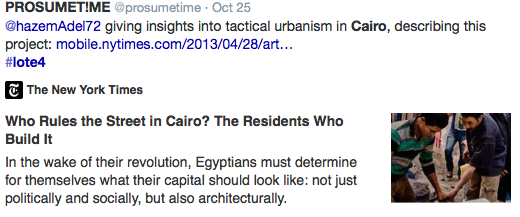
I made it downstairs in time for the unExpansion session which dealt with the future of the unMonastery but had to leave early to help make pasta that would take me the rest of the afternoon.
The final plenary consisted of the curators giving their responses to the sessions they attended. Robin Chase went first, quite memorably stating that she hadn't realized, "b"
Amelia gave us valuable insights into how the European Parliament works and projects should go about contacting their MEPs to receive some attention and maybe protection.
Fabrizio gave a word of warning about how and if stewardship initiatives are actually improving people's lives, or if we are setting ourselves up for a big disappointment.

At the end of the feedback session, the schedule for the unconference began to take shape and people were suggesting topics for Sunday's schedule which had been left almost entirely open for this purpose. It worked well because after all the sessions and feedback, many people's minds were churning out new ideas and this was their time to share with the group.
Unfortunately, I was not able to attend the Sunday unconference because I had to catch a flight, but this is where the tedious job of documenting pays off and anyone can review the sessions, feedback, or comments that have been sprinkled throughout the web between Twitter, Hackpad, Edgeryders site, Facebook, Trello, and more. If you can navigate these data trails, you may be able to get a better idea of what goes on at a LOTE and perhaps plan one yourself, because after all the work that goes into creating one of these, it might just have been the last.
